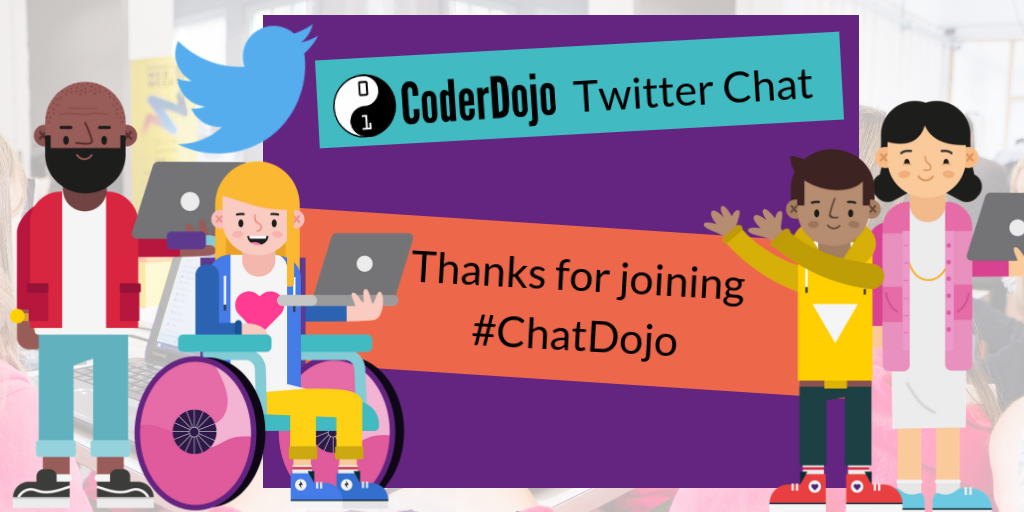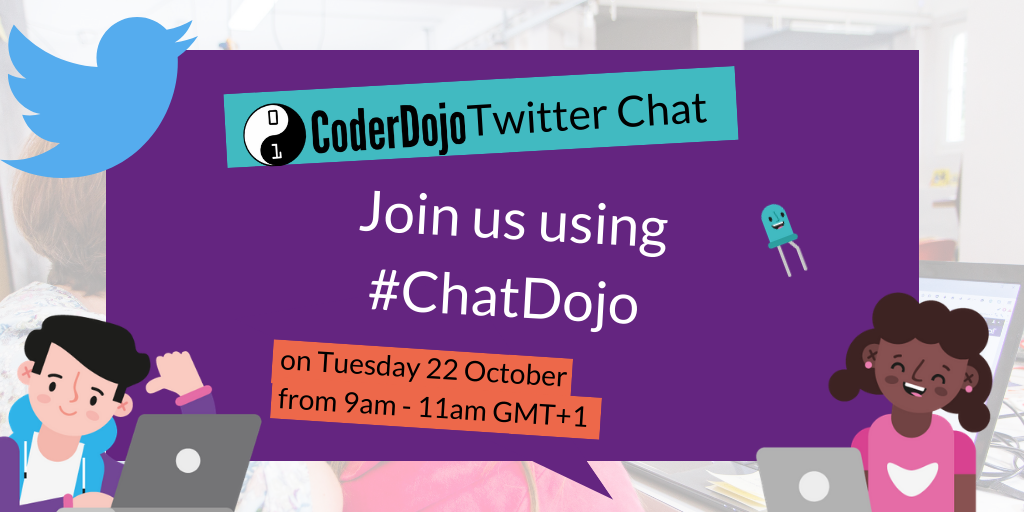
17th July 2019
Join our next #ChatDojo discussion — 22 October 2019
We are very excited to be hosting our next #Chat Dojo Twitter discussion on 22 October 2019, from 9am-11am GMT+1. To get an idea of what’s in store, you can take a look at the highlights from our June Twitter chat below!
Highlights of our #ChatDojo Discussion – June
On June 23 we held a two-hour Twitter chat giving CoderDojo community members the opportunity to share their experiences and insights. In advance of the discussion Dojo volunteers voted on the topics they wanted to discuss. These were, in order of preference:
- motivating volunteers
- project progression for young people
- new resources and projects
Thanks to all the volunteers around the world who took part! If you missed out, our next Twitter chat is on Tuesday 27 August. Below are a sample of the questions that were asked during #ChatDojo and some responses from participants. As per usual we started off our chat by learning more about the Dojos those taking part belong to:
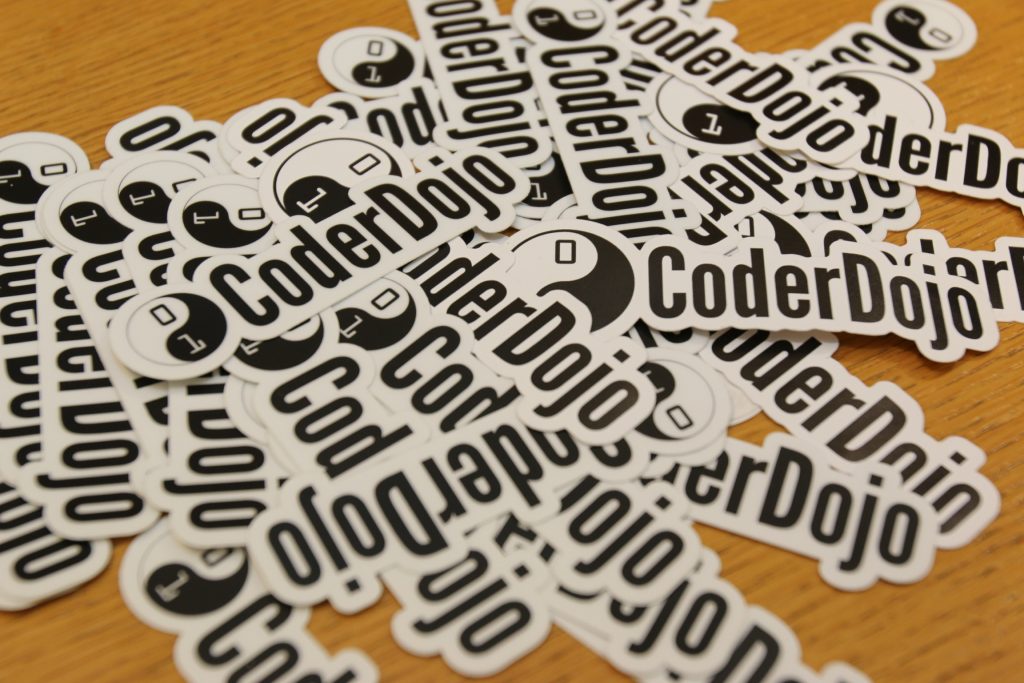
Q1. Tell us about your Dojo!
Those taking part are involved in CoderDojo clubs running for the last two months, to over 6 years! Champions and Mentors also shared how their Dojo sizes ranged from 8 children to over 80 Ninjas. The average number of volunteers attending each session ranged from 1 to 20!
Sahaza in Madagascar highlighted how the 8 Dojos he’s involved with have supported over 3,000 children to code over the last 4 years, including on the CoderBus, a bus decked out with laptops and desks, which travels around to rural areas!
5 years – 14 ninjas – 4 volunteers
— Warren G (@GillGamesie) June 25, 2019
2years, 20 kids, 5 volunteers (https://t.co/BgMVwbytu9) and just starting another one as a mentor i.e. CoderDojo Docklands (https://t.co/UVM8U8y86G). Hoping that in the years to come we have a network of CoderDojo’s here in Melbourne and possibly an annual #ChatDojo
— STEMDownUnder (@tangowhisky37) June 28, 2019
Q3. What motivated you to become a CoderDojo volunteer?
Motivations for people varied; from wanting to give back, seeing it as something really beneficial to young people, to even giving people something to do. A lot of volunteers initially got involved through someone they knew. Whether it was through bringing their children, or nephews and nieces to a session, their partner or colleagues already volunteering, those who got involved haven’t looked back since!
I was early one day and @NiambhScullion asked me to help with a new web beginners class. Haven’t looked back since.
— Vanessa Greene (@dalekmad) June 25, 2019
I was doing a IT in DCU, there was a dojo in DCU. Thought it was a great idea and that it would be brilliant in my area and it would be a great way for me to learn extra stuff as well. Through my job I already taught kids computer basics, next step really.
— Amanda O’Keeffe (@MandieOK) June 25, 2019
This is from a research paper on volunteer motivations;
It notes there are some situational circumstances you can’t influence (dark blue), and some you can light blue, while motives can’t be changed, you can highlight how your Dojo fits in with the persons motives 🙂 #ChatDojo pic.twitter.com/qZroczpxEl— ☯CoderDojo☯ (@CoderDojo) June 25, 2019
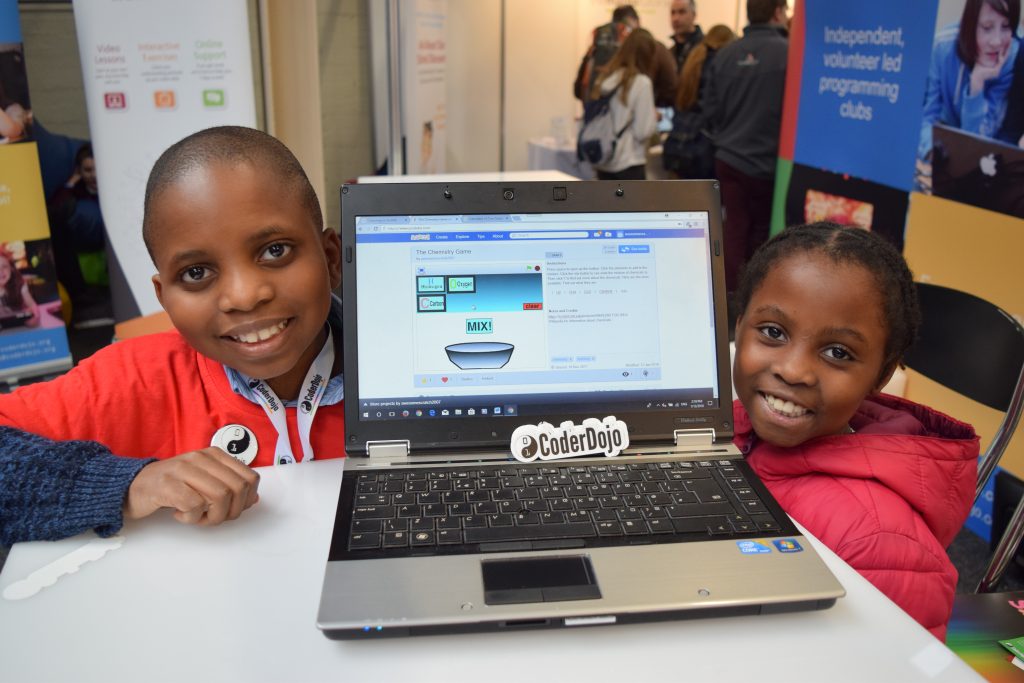
Q5. Do you have a list of projects/tasks young people work through during the year?
In advance of the chat some mentors had expressed their interest in a project pathway that young people could progress through. We wanted to see what Dojos were already using and if it was in demand among the wider Dojo community.
A5. Not really, ninja’s work through the Sushi Cards or on other or their own projects.
New ninja’s start with (from ????) #Scratch and go on to HTML/CSS or #Python or #RaspberryPi etc.#ChatDojo— Sanneke (@angelonmychest) June 25, 2019
I teach a younger group and they do like some structure I really like the code club resources and wonder if there could be more crossover. leaving the very young kids to their own devices can lead to temptation of online games etc so I like to do a project per session.
— Dave ???????????????? (@davidkeeley_) June 25, 2019
#ChatDojo for beginners start off with Scratch upto Christmas, HTML/CSS to Easter then introduce Javascript/python till Summer. This year slightly different they loved Scratch 3, we did this the whole year, beginners and non beginners.
— Amanda O’Keeffe (@MandieOK) June 25, 2019
We’re looking at how Dojos who want a little more structure can adapt certain sets of projects to their Dojos needs. Do you want to understand the skills young people are learning and help know what to progress on to after? If you are interested in trialing out some progression pathways and giving your feedback please email us at [email protected]
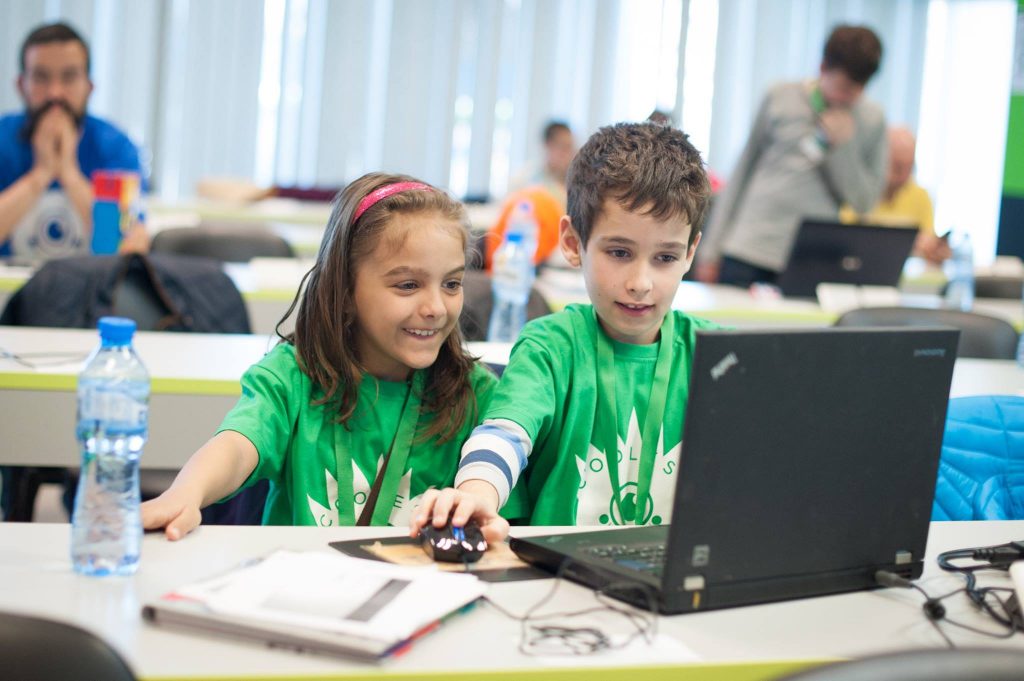
Q6. How do you measure children’s progression through projects, or skills learned?
We found most Dojos aren’t measuring progress in a structured way. Mentors are using a variety of ways to reward achievements including USB belts, badges and certificates. Volunteers highlighted seeing young people’s confidence develop, them offering to present the project they’ve made with the group, or by participating in Coolest Projects helped them assess children’s development!
very difficult is short answer.
We tried dojo belts, but found it very hard to measuŕe.
We currently do a ‘term’ completion cert as this gives flexability as to what we do in a term and allows us to promote more ‘soft skill’ like presenting and working together.— Bob Flynn (@bobflynn666) June 25, 2019
Progress can also be seen in terms of how much children enjoy the session and the feedback they give. This example is from a Dojo in Northern Ireland for young people with autism. #ChatDojo pic.twitter.com/dzEnqvr49w
— ☯CoderDojo☯ (@CoderDojo) June 25, 2019
Q10. How do you onboard or train new volunteers at your Dojo?
With many Dojos reporting mentor retention and motivation as a problem they encounter, we wanted to know how new volunteers were being on-boarded into Dojos, and if successful approaches could be replicated by others.
From our focus groups we know some Dojos help new mentors by having a “Buddy System” whereby a new volunteer is matched with a volunteer that has been involved for a while. They chat in advance, explaining what the new mentor can expect and meet them at the door to help them settle in.
A10. We let them mentor at the dojo, giving suggestions, by showing them how other mentors work. Twice a year we have a meetup with pizza and a workshop by one of the mentors.
And telling them there’s https://t.co/Kb0JI109Hf and https://t.co/07JKPD55qi @Raspberry_Pi #ChatDojo— Sanneke (@angelonmychest) June 25, 2019
#ChatDojo A10. First few dojos I like a new mentor to shadow one of the veterans.
— Brian Matthews (Браин Мэттьюс) ???????????????? (@bmatthews68) June 25, 2019
Q12. What do you use to help potential volunteers find your club?
The CoderDojo platform is a great resource for anyone who searches for a coding club to volunteer with in their local area. We noticed that some volunteer requests in the platform are left pending, despite those Dojos looking for volunteers. We wanted to know what clubs are using to source volunteers to better understand their needs.
#ChatDojo A12. We’ve tried social media and the press but the only success has come from word of mouth.
— Brian Matthews (Браин Мэттьюс) ???????????????? (@bmatthews68) June 25, 2019
A12. Social media and attending meetups where there will be coders etc #ChatDojo
— CoderDojo Banbridge (@CoderDojoBanb) June 25, 2019
How can you check if your Dojo has pending mentor requests?
Log in to the CoderDojo platform, if you are a Dojo champion go to the My Dojo section, select your Dojo and click “Manage Users”. Then select the “User Requests” tab on the top right. You will see who has applied to be a member of the Dojo and also the role they requested to join as. Accept those you want to join the Dojo in the capacity requested.
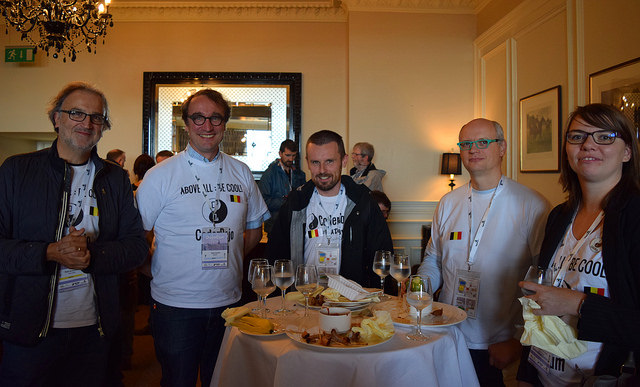
Q13. What’s the best piece of advice you could give to potential Dojo volunteers?
A13. Visit a(nother) dojo to feel/see what a dojo is. Join Global CoderDojo Slack. Follow dojo’s on social media. Just do it.#ChatDojo
— Sanneke (@angelonmychest) June 25, 2019
A13. Give it a try, commitment free. If it’s not for you, that’s cool, but if it is then even cooler! #ChatDojo
— CoderDojo Banbridge (@CoderDojoBanb) June 25, 2019
Thanks to all who shared their experiences with us on the day. We can’t wait for our next discussion with volunteers on our community webinar on Tuesday 23 July. All are welcome to join!
